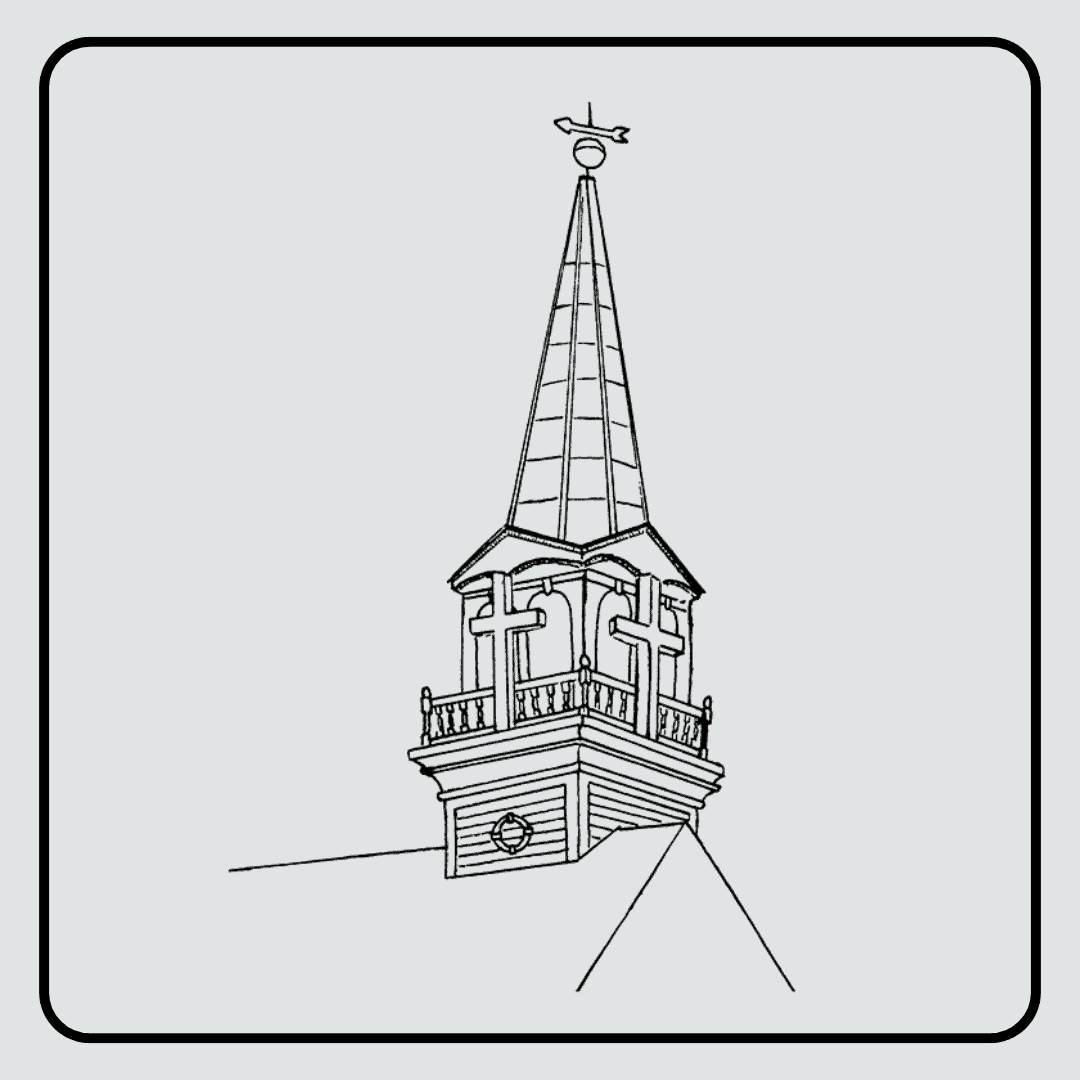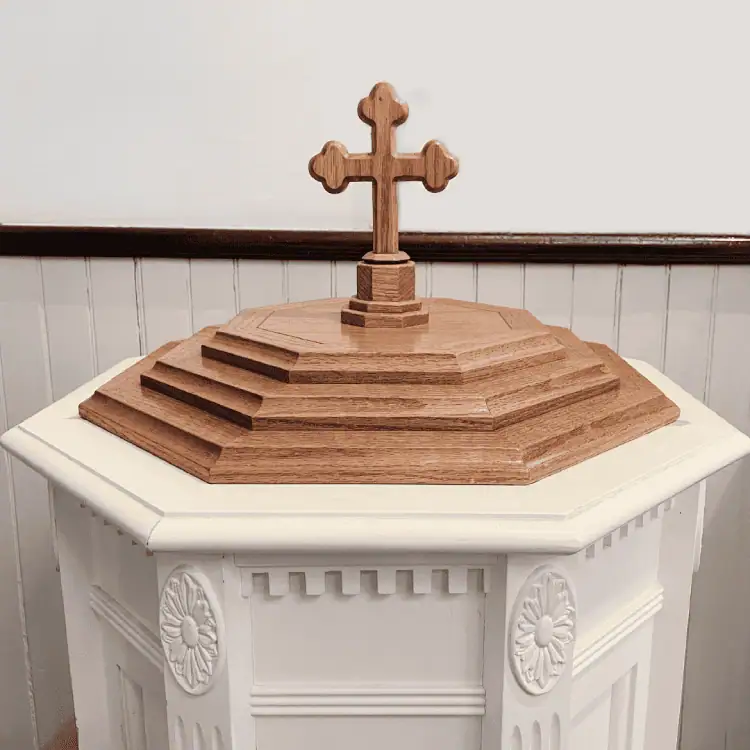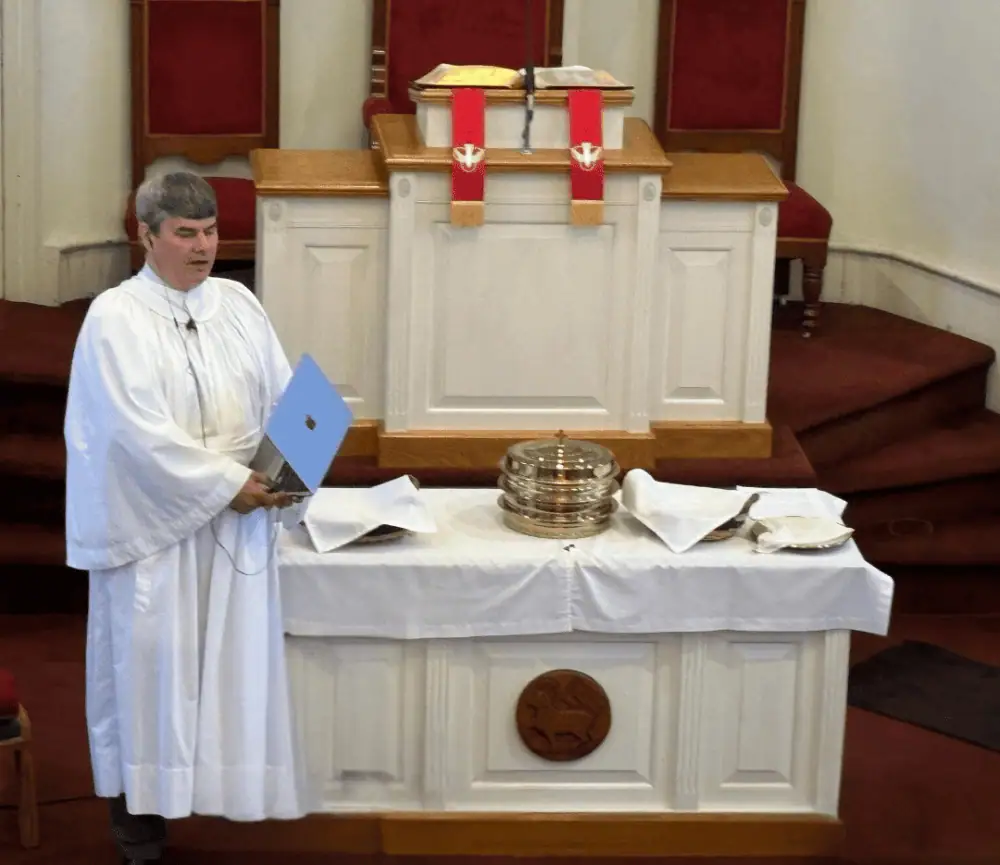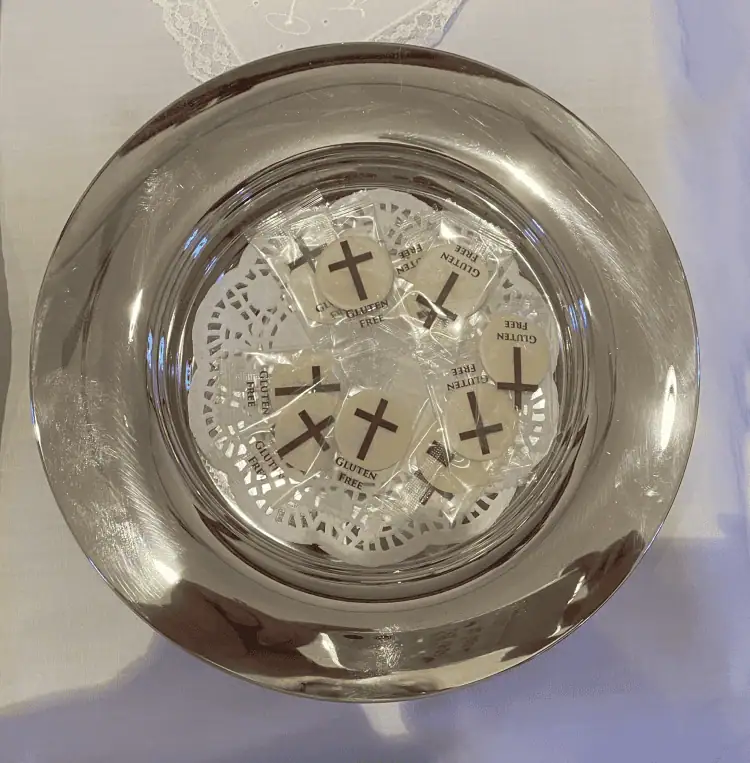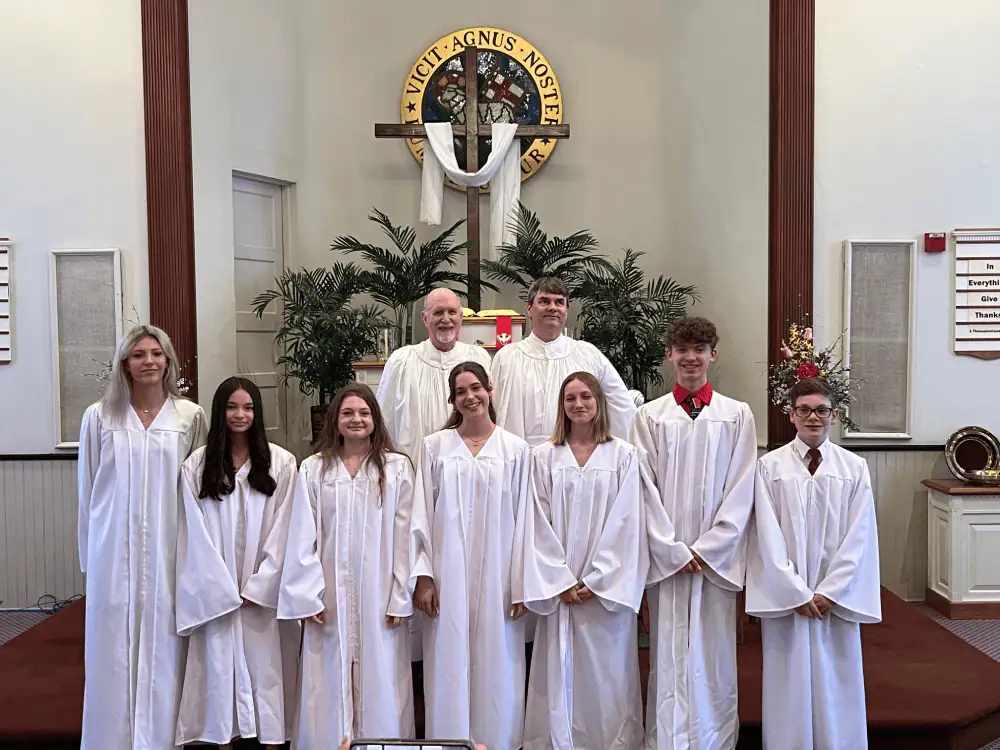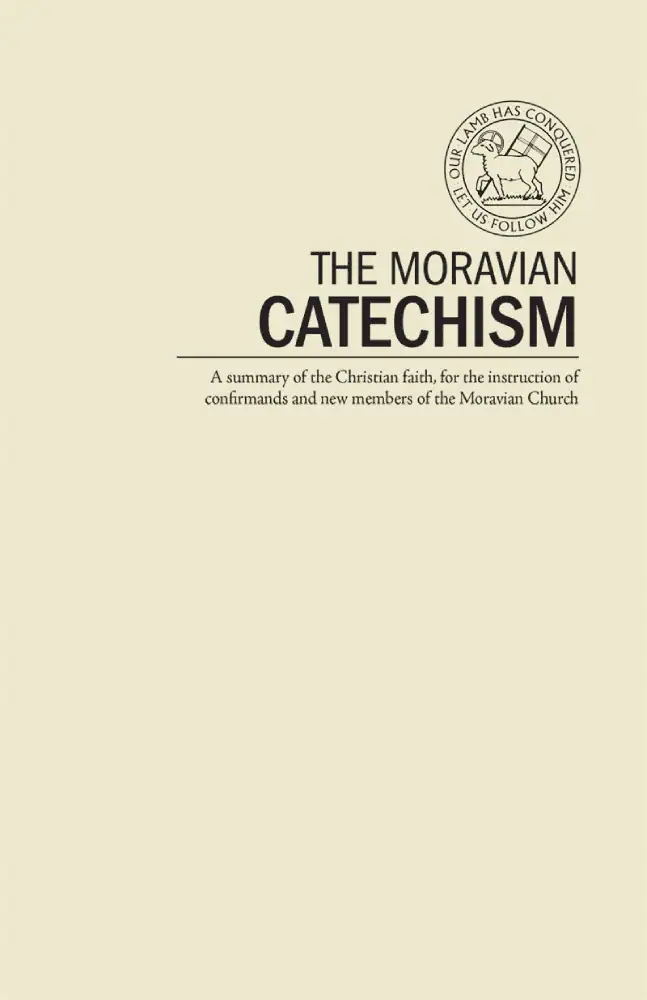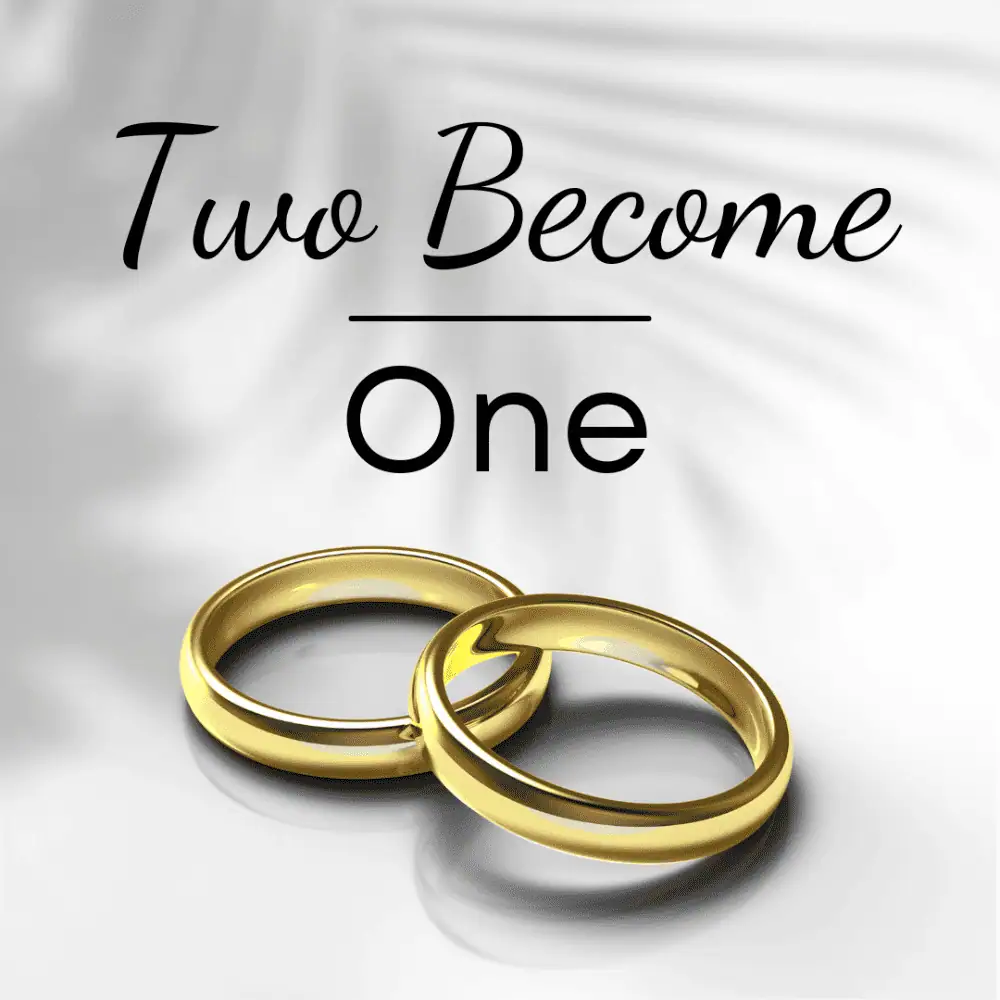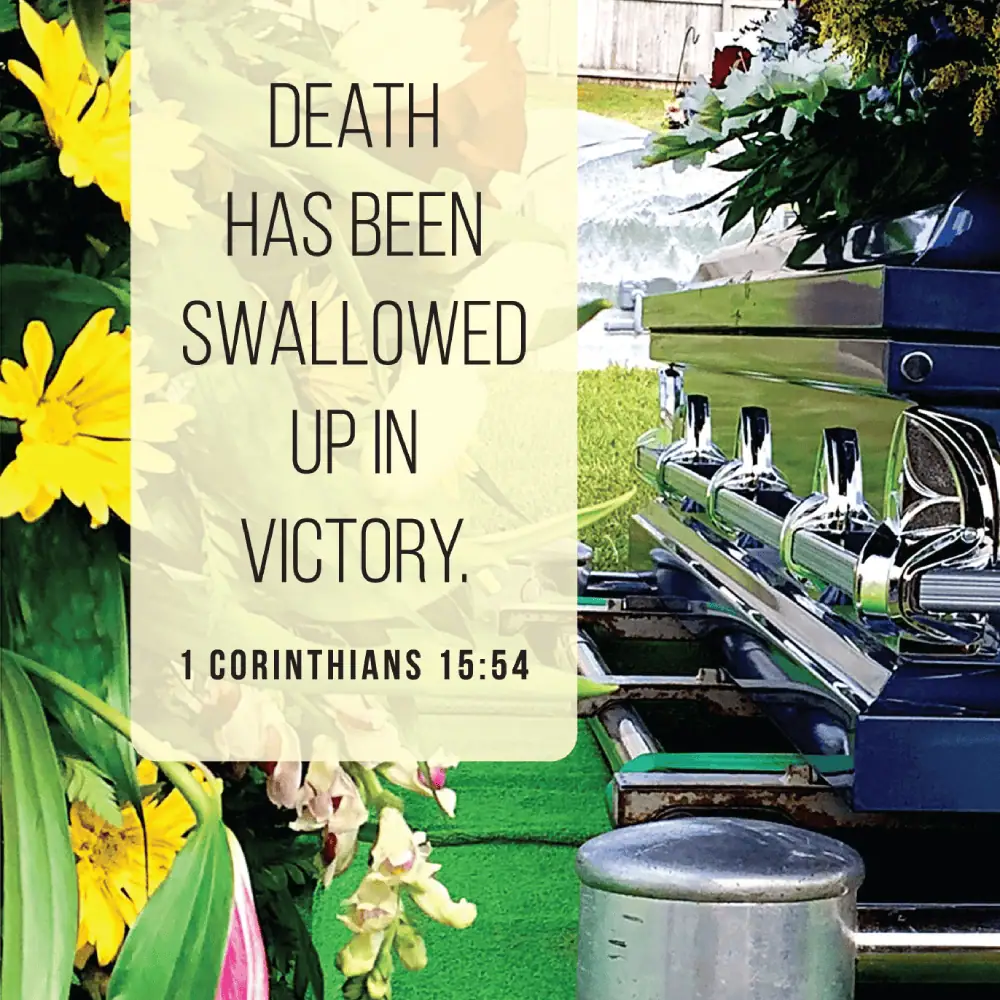Certain rituals have a long tradition in the life of the church. These rituals are considered either sacraments or rites and are shared by all Moravian churches.
Sacraments are specific actions through which the Holy Spirit imparts the blessings of God’s promises to believers. They were instituted by Christ who told his followers to observe them. Sacraments use visible signs (water, bread, wine/juice) to symbolize God’s invisible grace. The two sacraments practiced by the Moravian Church are Baptism and Holy Communion.
Through baptism the individual receives a pledge of the forgiveness of sin and admission into the covenant of God through the blood of Christ. The Moravian Church does not try to define the mystery of Christ’s presence in the communion elements, but recognizes that the believer participates in a unique act of covenant with Christ as Savior and with other believers in Christ.
The rites of the Moravian Church are Confirmation, Marriage, Funerals, and Ordination. Celebration of the rites follows a liturgical form set forth in the hymnal. They are a means of affirming the Christian faith and of dedicating oneself to a way of life consistent with that faith. The clergy are trained and set apart to administer these rites as servants of God and ministers of the Church.
If you would like, you may click one of these links to jump to that specific rite or sacrament: Baptism, Holy Communion, Confirmation, Weddings, Funerals.
The Sacrament of Baptism
According to Matthew 28:19, Jesus instituted the Sacrament of Baptism when he commanded that his followers should make disciples of all nations, “baptizing them in the name of the Father, the Son, and the Holy Spirit.” For two hundred years the Moravian Church has introduced these words with the phrase “Into the death of Jesus I baptize thee.” Moravians believe that in baptism we are united with Christ in his death, therefore we have died to sin, having been cleansed by Jesus’ sacrifice, and should walk in newness of life.
Therefore, baptism is a reminder and affirmation of the salvation we know as the result of Jesus Christ’s sacrifice for us on the Cross. It is the visible means of entry into the new covenant between God and the people of God, and the means by which a person enters the fellowship of the Christian church.
Moravians appreciate the significance of both kinds of baptism: The baptism of an adult who has newly become a Christian reminds us that faith is required of all who are baptized. The baptism of a child – particularly the baptism of an infant – reminds us that God’s love precedes any act of faith on our part.
Moravians believe in one baptism for the remission of sins and recognizes the baptism of all children and adults who were baptized in any Christian church in the name of the Father, the Son, and the Holy Spirit. Moravians do not re-baptize people who have been previously baptized in our own or another denomination as children or adults.
The usual mode of baptism at Schoeneck is sprinkling, and the church administers the sacrament in the name of the Triune God (Father, Son and Holy Spirit). Baptisms are performed during regular worship services. Arrangements are made in advance with Pastor Ian, who will arrange preparation classes as appropriate. There is no charge for baptism.
When an adult is baptized, they become a full communicant member of Schoeneck Moravian Church. Infant Baptism makes a child a non–communicant member of the congregation. Baptized children become full communicant members of the church at adolescence through the Rite of Confirmation.
Please contact Pastor Ian if you wish to be baptized or to have your child(ren) baptized.
The Sacrament of Holy Communion
Holy Communion is known by several names. As “Communion,” it reminds us of the union it brings us with God and other Christians, past and present, near and far. As “the Lord’s Supper,” it recalls the meal at which our Lord instituted the sacrament. As “the Eucharist” (from a Greek word meaning thanksgiving), it is an expression of our thanks for all God does for us in our Savior Jesus Christ.
Jesus established the Sacrament of Holy Communion during the Last Supper with his disciples in which he said, “This is my body which is given for you. This is my blood of the new covenant. Do this in remembrance of me.”
Our emphasis on the Sacraments of Baptism and Holy Communion as gifts of God’s grace is why the Moravian Church practices open communion. If you have been baptized, regardless of denomination, you are welcome to partake in the sacrament of Holy Communion with us. We believe that, in the Sacrament of Baptism, God in Christ makes us all members of the one holy universal church, and not just members of a particular denomination. Since we believe Holy Communion is also a gift of God’s grace, it is also intended for all Christians. It is the Lord’s Table, not our own.
In Holy Communion, the bread and wine – with prayer and faith – become a means of experiencing God’s grace in a special way. In receiving the bread and cup, we are truly united with God and the Holy Spirit in Christ Jesus. The Moravian Church does not try to explain the mystery of the sacrament of Christ’s presence in the bread and wine. We affirm that Christ is present in the sacrament and meets us there, but we do not define precisely how this occurs.
The Moravian service of Holy Communion is a service of praise and prayer, of fellowship, and of renewing the new covenant with Christ and with each other. As we join our fellow congregation members in this act of worship, we also join with believers of all times and places who have celebrated this sacrament. Holy Communion reminds us of Christ’s sacrifice for us in the past; it affirms Christ’s presence with us in the present; and it strengthens us to continue in faith and hope “until he comes.”
Therefore the sacrament of Holy Communion engages believers in an act of covenant with Christ and other believers in a place where past, present, and future come together.
Holy Communion At Schoeneck
In a Moravian celebration of Holy Communion the emphasis is on the grace and work of God for us in the life, death, and resurrection of Christ, made present and active through the Holy Spirit. Everything is to be done with simplicity and dignity.
This is why Pastor Ian wears a plain white robe (called a surplice) while presiding at communion. This is not a badge of office or rank, but rather a symbolic blanking out of the pastor’s individual personality and ideas.
Ultimately it is not the pastor, but Jesus Christ who presides at the sacrament, consecrates its elements, and gives grace as these elements are distributed and received.
The form in which Holy Communion is served in the Moravian Church differs from that of other denominations. It is based upon practices that began in the 15th century. The bread and the cup are brought to the congregants by the pastor (or by a member of the Board of Elders), symbolically reminding us that God, through Jesus Christ, comes to each one of us where we are.
Hymns convey the particular theme of the service and are sung during the distribution of the bread and cup.
Schoeneck’s communion elements are communion wafers or freshly baked bread and grape juice. Gluten-free wafers are available upon request.
We shake hands with other congregation members near us twice during the service. The first handclasp at the beginning of the service signifies oneness in Christ and the desire to be at peace with one another. The second handclasp at the end of the service signifies renewed dedication and unity of purpose in the service of Christ.
Services of Holy Communion are shared periodically throughout the year.
Baptized children may be admitted to Holy Communion provided they have an age–appropriate understanding of the sacrament or after appropriate pastoral instruction and counseling with the children and their parents/guardians concerning the meaning and observance of the Lord’s Supper. If you think your child is ready to receive Holy Communion, please contact Pastor Ian.
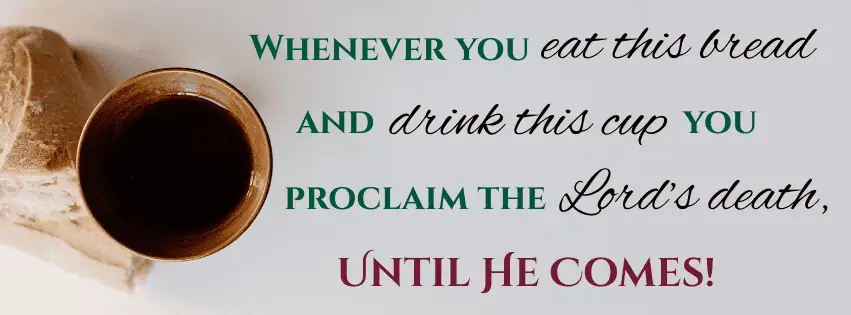
The Rite of Confirmation
When a person who was baptized as a child is ready to publicly profess their faith in Christ and accept the responsibilities of church membership, they reaffirm their baptism through the Rite of Confirmation. Confirmation is an expression of a personal commitment to Christ and to the Christian life.
In this rite, one becomes a confirmed communicant member of the Moravian Church. Therefore confirmands must each make a personal decision to accept the responsibilities and privileges of membership in the church.
This includes continued participation in worship, Sunday School, and youth programs; a commitment to serve the church and the larger community; financially supporting the work of the Schoeneck congregation; and bearing witness to the love of God for the world.
Confirmation is a significant commitment for an adolescent to make — it is crucial to see confirmation as a step along their faith journey, and not as an end to growth in the understanding or practice of their faith. This is not a once-and-done task to be completed — rather for faith to thrive it requires life-long attention and care on their part, as well as encouragement and love on ours, their church family.
During confirmation, the congregation also affirms the confirmands’ public profession of faith by pledging their love and the continued nurture of them in Christ’s community.
The Confirmation Program
In the Moravian church, confirmation follows a period of instruction in Bible study and education in the doctrines, practices, and heritage of the church. Confirmation Classes are designed to provide the confirmands with the tools, support, and inspiration they will need to build their faith on a firm foundation. It’s their time to ask questions and participate in conversations and activities with the hope they will not only learn about Christianity, but that they will make a holy connection with God and his deeply abounding love.
The intent of the program is to provide our students with an understanding of what it means to live in the world as a Christian. The choices we make, the options we choose, the values we hold are shaped by our understanding of what it means to live as a disciple of Jesus in community with other disciples.
After a period of study and personal reflection, confirmands are asked to profess their faith by affirming the following questions:
“Do you believe in God as your loving Creator, in Jesus Christ as your Savior and Lord, and in the Holy Spirit as your Comforter and Sustainer, according to the Holy Scriptures?”
“Do you in this faith turn away from sin, evil, and selfishness in your thoughts, words, and actions, and do you intend to participate actively in Christ’s church, serving God all the days of your life?”
The Mentor Program
Education for confirmation is not the responsibility of just the pastor and confirmation instructors, but of the parents and the entire congregation as well. We all must provide an example of what it means to be a Christian so that the young people can see faith in action.
For this reason, in the second year of the program, confirmands choose an adult who is active in the church (outside of their immediate family) to be their Confirmation Mentor. Mentors are by no means expected to know all the answers; rather they are asked to answer what they can and search alongside their confirmand for what they can’t.
When Can My Child Be Confirmed?
Those children who are currently in 7th and 8th grade, as well as older children who have not yet been confirmed, are eligible to join Schoeneck’s Confirmation Class. Classes run with the traditional Sunday School year timing (September through mid-June).
Please note: Youth wanting to be confirmed do not have to be baptized before starting Confirmation Class. They can be baptized either before Confirmation or will be received at Confirmation through the Sacrament of Baptism. We will gladly have that conversation with the confirmand and their parents when the time comes.
Please contact Pastor Ian for more information about your child(ren) joining the Confirmation Classes at Schoeneck.
Weddings
Marriage is a sacred covenant between two people who choose to spend the rest of their lives together. In the Christian faith, marriage is not just a legal contract or a social commitment, but a spiritual union between two people who are joined together by God. Both spouses are called to love and respect each other, to serve and support each other, and to be faithful to each other.
As early as 1764 a special Marriage Liturgy was prepared for use at Moravian weddings. This is because at the heart of every wedding is a worship service. During this special worship service, praise and thanksgiving are given to God by the people being married for the love they share with one another. In addition, the couple make sacred vows to one another before God and their families and friends.
The Moravian Church considers marriage to be honorable among all people and that it is not to be entered into unadvisedly or lightly, but discreetly, thoughtfully, and with reverence for God. A Christian marriage is a holy relationship — a covenant with God and with one another.
It is therefore essential that the wedding blend both joy and reverence. To that end, our Pastor and our Director of Music Ministries will guide you in making choices for your ceremony that reflect your relationship while also retaining the sacred meaning of a wedding. Couples considering marriage in our sanctuary must participate in counselling sessions with the pastor prior to the ceremony. Schoeneck Moravian Church hosts marriage ceremonies for couples regardless of religious affiliation or sexual orientation.
Weddings are held in our Sanctuary, and the Fellowship Hall is available for rent for small family receptions.
For additional questions, including how to schedule a wedding, please contact the Church Office.
Funerals & Memorial Services
A funeral or memorial service is one that celebrates the life of a person who has died, while giving thanks for the promise of eternal life with God. At Moravian funerals, this moment of farewell and mourning is marked by a confident hope in the resurrection. That is why many Moravians choose to have the Easter Liturgy celebrated at their funeral.
Moravians often describe death as “entering the more immediate presence of the Savior” or “being called home.” We believe that our relationship with God and each other is primary. As followers of Christ, we believe that life here on earth has its own worth and dignity, just as Jesus’ earthly life did.
Like Jesus, our relationship with God continues after death in a fullness we do not know here on earth. We believe that we will be in the direct presence of God and we will still have a personal existence. We trust that God will take care of the details of eternal life, and that we are called by grace to live in gratitude for God’s love at all times.
Schoeneck Moravian Church opens our hearts and our sanctuary to any grieving family wishing to use our church facilities at this difficult time. Our pastor and congregation will provide support and solace to your family and assist you in planning an appropriate funeral or memorial service. If desired, we can provide refreshments and prepare a space for a reception following the service. Please contact the Church Office for more information.
Some information on this page is from “The Moravian Catechism” © 2020 Interprovincial Board of Communication, Moravian Church in America. All rights reserved.
Some information on this page is from the Moravian Church Brochure “The Rite of Baptism” © 2010, Interprovincial Board of Communication, Moravian Church in America. All Rights Reserved.
Some information on this page is from the Moravian Church Brochure “The Sacrament of Holy Communion” © 2010, Interprovincial Board of Communication, Moravian Church in America. All Rights Reserved.
Some information on this page is from the Moravian Church Brochure “The Observance of the Lord’s Supper” © 2010, Interprovincial Board of Communication, Moravian Church in America. All Rights Reserved. Some information on this page is from the Moravian Church brochure “The Rite of Confirmation” © 2010, Interprovincial Board of Communication, Moravian Church in America. All Rights Reserved.
